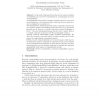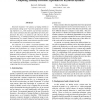13457 search results - page 20 / 2692 » Can we elect if we cannot compare |
TCC
2005
Springer
14 years 1 months ago
2005
Springer
In this work, relations between the security notions standard simulatability and universal simulatability for cryptographic protocols are investigated. A simulatability-based notio...
ATAL
2006
Springer
13 years 9 months ago
2006
Springer
Can a good learner compensate for a poor learner when paired in a coordination game? Previous work has given an example where a special learning algorithm (FMQ) is capable of doin...
SIAMCOMP
2011
12 years 10 months ago
2011
The Gibbard-Satterthwaite theorem states that every non-dictatorial election rule among at least three alternatives can be strategically manipulated. We prove a quantitative versi...
MM
2009
ACM
14 years 2 months ago
2009
ACM
There are still no established methods for the evaluation of browsing and exploratory search tools. In the (multimedia) information retrieval community evaluations following the C...
DSN
2009
IEEE
14 years 2 months ago
2009
IEEE
Keystroke dynamics—the analysis of typing rhythms to discriminate among users—has been proposed for detecting impostors (i.e., both insiders and external attackers). Since man...


